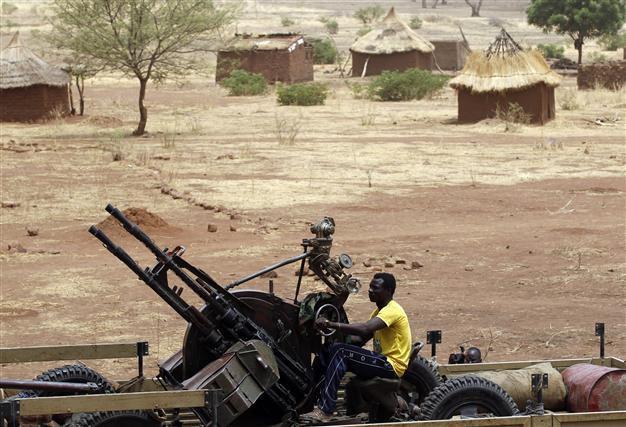South Sudan accuses Khartoum of new bombings
JUBA - Agence France-Presse

A SPLA-N fighter sits with an anti-aircraft weapon near Jebel Kwo village in the rebel-held territory of the Nuba Mountains in South Kordofan, May 2, 2012. REUTERS photo
Sudanese warplanes and long-range artillery bombarded South Sudan border regions Thursday, defying a UN Security Council ultimatum to end hostilities or face possible sanctions, the South's army said."Their aircraft dropped bombs and artillery was fired targeting an SPLA (Southern army) base... this is an indication of preparation for a ground attack," said Southern army spokesman Philip Aguer.
The UN body on Wednesday demanded fighting between the arch-rivals stop within 48 hours.
The attack could not be independently confirmed, and Khartoum's army has repeatedly denied a wave of air strikes that has hit the South's oil rich Unity border state in recent weeks.
Sudan and South Sudan have edged to the brink of all out war in weeks of bloody clashes, which peaked in the South's seizure of the key Heglig oil field from Khartoum's army, before pulling back after international condemnation.
However, clashes and air strikes by Sudanese warplanes have continued since then, prompting the Security Council's ultimatum in New York late Wednesday.
The UN council ordered the two sides to restart African Union-mediated peace talks within two weeks. The resolution threatens additional non-military sanctions if either side fails.
Aguer said six bombs were dropped by MiG fighter jets on the Southern frontline position at Panakuach, while warplanes and long range artillery bombarded an army base at Lalop, some 25 kilometres (15 miles) back.
"The SPLA there are preparing for an attack, they are ready to defend their positions," Aguer added. Troops and tanks from both sides have dug into fortified defensive positions along their volatile border.
The last ground attacks were on Tuesday, when troops clashed in the South's Unity state.
The council ordered the two sides to restart AU-mediated peace talks within two weeks. The resolution threatens additional non-military sanctions if either side fails.
"I think it's a very good resolution as it's going to sanction those who do not accept the decision... we already have," Southern Information Minister Barnaba Marial Benjamin said.
Warning of a looming "full scale and sustained war," US ambassador Susan Rice told the council "both countries are on the brink of returning to the horrors of the past and threaten to take the entire region with them." While still one country, north and south Sudan fought a two-decade civil war up to 2005 in which more than two million people died.
In New York, South Sudan's Minister for Cabinet Affairs Deng Alor Kuol offered his country's "solemn commitment" to follow the resolution.
But he appealed to the United Nations to "urgently mobilize humanitarian assistance for the population affected by Sudan's continuous aerial bombardments and ground incursions" into the South.
Sudan's UN ambassador Daffa-Alla Elhag Ali Osman expressed reservations about the resolution, however.
"Peace between the two republics, Sudan and South Sudan, will only be achieved by halting all forms of support and sheltering proxy rebel and armed groups espoused by South Sudan," Osman told the council.
Aguer said the South feared renewed conflict and that Khartoum would not listen to UN demands.
"For the last two years, I have been reporting air bombarding, and I don't think Khartoum will stop with just UN wishes -- they have always denied bombing, but who else is it?" Aguer added.
"Wishes cannot work alone -- the UN should come and monitor the border." Both sides accuse each other of arming rebel fighters as proxy forces to attack the other -- claims each side deny.
















